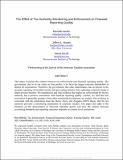The Effect of Tax Authority Monitoring and Enforcement on Financial Reporting Quality
Author(s)
Hanlon, Michelle; Hoopes, Jeffrey L.; Shroff, Nemit
DownloadHanlon_The effect.pdf (466.5Kb)
OPEN_ACCESS_POLICY
Open Access Policy
Creative Commons Attribution-Noncommercial-Share Alike
Terms of use
Metadata
Show full item recordAbstract
This paper examines the relation between tax enforcement and financial reporting quality. The government, due to its tax claim on firm profits, is de facto the largest minority shareholder in almost all corporations. Therefore, the government, like other shareholders, has an interest in the accurate reporting of (taxable) income and preventing insiders from siphoning corporate funds to obtain private benefits. We hypothesize and find evidence that higher tax enforcement by the tax authority has a positive association with financial reporting quality. Further, we find that this association is generally stronger when other monitoring mechanisms are weaker. Our evidence is consistent with the predictions from the Desai, Dyck, and Zingales (2007) theory that the tax authority provides a monitoring mechanism of corporate insiders. Our paper also adds to the literature on the determinants of financial reporting quality and how the relation between accounting standards and reporting outcomes depends on country-level institutions.
Date issued
2014-11Department
Sloan School of ManagementJournal
The Journal of the American Taxation Association
Publisher
American Accounting Association
Citation
Hanlon, Michelle, Jeffrey L. Hoopes, and Nemit Shroff. “The Effect of Tax Authority Monitoring and Enforcement on Financial Reporting Quality.” The Journal of the American Taxation Association 36, no. 2 (November 2014): 137–70.
Version: Author's final manuscript
ISSN
0198-9073
1558-8017